November 7, 2018 VG Teaching Resources Vocab & ELA Res, Vocab Gal, ELA K-5, ELA Seasonal Back to School, ELA 6-8, ELA Resources - Activities, ELA 9-12, ELA PD - Classroom Management, ELA PD - Vocabulary, ELA Focus - Writing with Vocabulary, ELA Focus - Vocabulary
11 Vocabulary Homework Ideas And How To Motivate Students To Do It!
By: Vocab Gal
Homework is such a valuable formative assessment for both teachers and students, and yet students are motivated* by many different factors when it comes to their desire to actually complete the work. In this article, I'm sharing how to motivate students to do their homework and 11 vocabulary homework ideas and worksheets that work in grades 1–12. Plus, preview and grab my 7 Options for Vocabulary Homework Kit.
Keep scrolling to find vocabulary homework ideas!
How to Motivate Students to Do Their Homework
As a teacher, I try to concentrate students’ learning on activities done in class, because asking some students to complete work at home can be daunting. Many times in my career I have been discouraged when more than half the class does not return to class with their homework assignment complete.
Yet we only have so many minutes with our students, and we need them to practice the concepts and skills they are learning until the knowledge becomes ingrained. Most students have a homeroom, study hall, or other downtime during the day in which they could complete activities, they just have to be motivated to do it.
Many studies cite “student choice” as one of the most important factors in inspiring students to learn. When students have the opportunity to select what questions to answer, what activity to complete or what role to play, they tend to feel more comfortable and confident about performing.
Additionally, research shows that when students are dedicated to a task important to them, like improving their video game scores, or optimizing their success on a playing field, they will go to great lengths to improve. While probably not as meaningful as their video game level, students will be more excited to answer questions about themselves than a generic worksheet.
By providing students with both choice and a topic that is personally meaningful, homework can be a great learning exercise as well as an important formative assessment.
Steps to Ensure Students Complete Homework
There are a few other motivating factors that can help establish homework as a meaningful part of a student’s educational experience. Here are suggested steps a school, parish, department, or teacher might take to ensure successful homework completion.
Step One
First, confirm that students have a strong rapport with their teacher(s). While it is difficult to cultivate a deep relationship with each student, teachers should strive to show students that they value their students and are committed to helping them learn and grow to their fullest potential. I would encourage teachers not to assign homework for the first few weeks of school until they develop a classroom community of respect and appreciation for learning.
Step Two
Second, once the classroom community has been established, teachers should specifically explain the importance of homework as a way of deeply ingraining knowledge. Teachers should also make it clear that homework is a meaningful formative assessment where both they and their students can understand what students know and where there are knowledge gaps.
Step Three
Third, some students may be quite unhappy when being mandated to do specific work. Therefore, teachers should stress the choices a student gets when completing their homework and that students get to complete the work that best reflects their own sense of self.
Step Four
Finally, the teacher should praise students individually, as well as praise the class when homework is turned in on time. Many students thrive on positive reinforcement and also many may feel guilt if they let their classmates or teacher down. Additionally, as many teachers know, a word of encouragement or a small sticker can make the difference to many.
How to Respond When Homework is Not Completed
When at last it comes time for homework collection, there will be students who did not complete the assignment, no matter how well it was set up. Teachers can again encourage students who did not complete the homework in time to think about what may motivate them to complete it. If a student seems to dislike direct mandates, providing support such as, “I know that you value your learning and will find a way to demonstrate your abilities,” might be more effective than, “Turn in your paper by Thursday or it’s a zero!”
For others who seem driven by the need to please or help others, teachers might encourage students by stating, “I’m disappointed that you weren’t able to complete your work on time, and I know you will submit your work in order to show us both what you know and understand,” might work better than, “Don’t you want the credit for this assignment?”
Vocabulary Homework Ideas for Students
For this post, I have a few homework assignments that model these ideas. Both in my new It's All About Me vocabulary practice page, and my tried-and true, 7 Options for Vocabulary Homework bundle, students are motivated to continue their learning because they have both choice and a focus on themselves, a topic in which they are already invested.
My new It's All About Me Vocabulary Activity tasks students with answering a series of questions about themselves using vocabulary words in context. On the first page of this download students will list their vocabulary words and write their own brief definitions. On the second page student will answer eight prompts. Each response should include at least one of the vocabulary words from their list in context. In each of their answers students must underline the context clues that would help someone unfamiliar with the word understand what it means.
With the 7 Options for Vocabulary Homework bundle, students can choose from a variety of fun and engaging activities for learning or reviewing vocabulary words. In addition to the homework selection sheet, the bundle includes worksheets for vocabulary homework ideas number five and six. The other vocabulary homework options can be completed on a plain piece of paper or in student workbooks.
Here are the vocabulary activities listed on the 7 Options for Vocabulary Homework handout:

#1 Say Your Words
Do you love the sound of your own voice? Do you tend to learn information by teaching others? Then try saying each of the vocabulary words, out loud and in context, to friends, family, strangers, etc. Use either your flashcards or your list of words, and make sure to get initials from someone who heard you say your vocabulary sentence. If you can’t get a signature, just explain when and how you said the sentences and we will invoke the HONOR SYSTEM! Create two sentences per word.
Do you love to write? Do you copy your notes to help you remember information? Then try writing two sentences for each vocabulary word. These can either be two individual sentences for each word or you can put all of your words together in a story. (If you write a story, you only have to use each word once). Have fun and get creative – amuse me and impress me, but make sure you use your vocabulary words in context!
#3 Write Your Words in Other Classes
As an alternative to the above “Write your Words,” use your vocabulary in your assignments for other classes – social studies essays, science notes, art descriptions, etc. Write down the vocabulary you used for this assignment (For example: On my science test I said “Newton was meritorious,” etc.). You can abbreviate your explanations slightly, as long as I understand you know the word’s meaning; remember to use each word twice.
#4 Become Your Words
Do you gesture when you talk? Is it hard for you to sit still? Then consider creating motions to go along with your words. Cry for lament, raise your arms in praise for approbation, etc. See me during class to “perform” your motions, or write them down, making sure that the connection between word, meaning, and gesture makes sense.
#5 Draw Your Words
Are you an artist? Do you constantly doodle? Then create cartoons or drawings that illustrate each word’s meaning. Create one drawing or cartoon per word and make them neat, using clean white paper (consider using recycled paper that has printing on the other side). Paperclip all your drawings together for the end of the week.
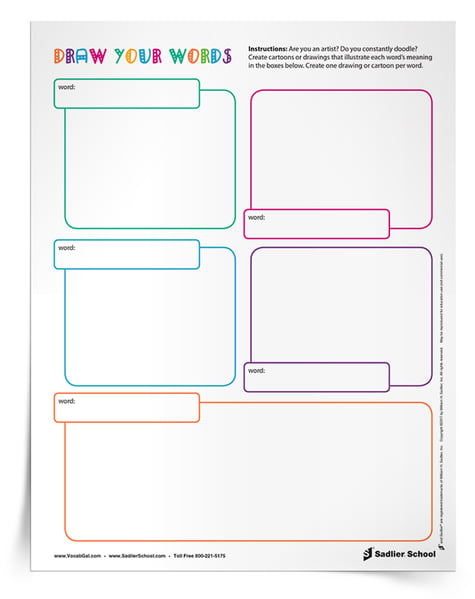
#6 Sing Your Words
Do you love to sing? Are you constantly creating your own raps? Try rewriting the lyrics to a song to incorporate each of your vocabulary words or write your own song, rap, etc. You can also write poetry; regardless of the form you choose, the words should be used in the correct context.
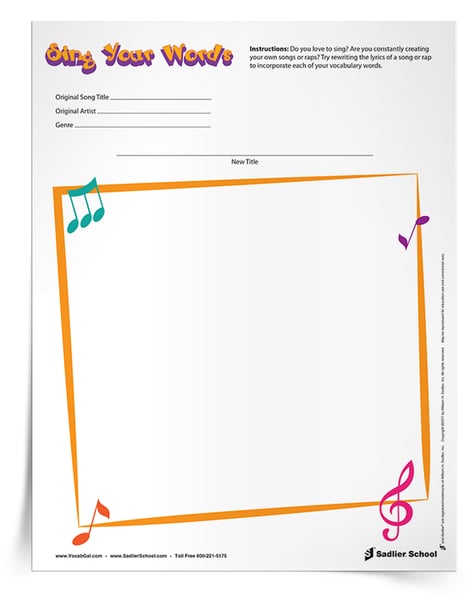
#7 Test Your Words
Do you want to play teacher and write the test as well as take it? Now you can! Create a vocabulary test using all the words in a variety of different types of questions. Make sure to create the answer key to the test as well.
Download the 7 Options for Vocabulary Homework bundle and have students keep the selection sheet in their binders. Now they have seven weeks of vocabulary homework assignments!
Additional Vocabulary Homework Ideas
|
|
|
|
In Summary
Ultimately, establishing a culture of community and trust in the classroom, explaining the reasoning behind and the benefits of homework, and providing choice and meaningful topics can make a significant difference in completion rates. Even if homework is not completed on time, teachers can still work to connect with each student to provide motivation to complete the assignments.
As educators, we all strive to make learning exciting and applicable to our students. By setting up clear expectations and providing interesting options, we can make any homework, including vocabulary homework, meaningful and valuable to students.



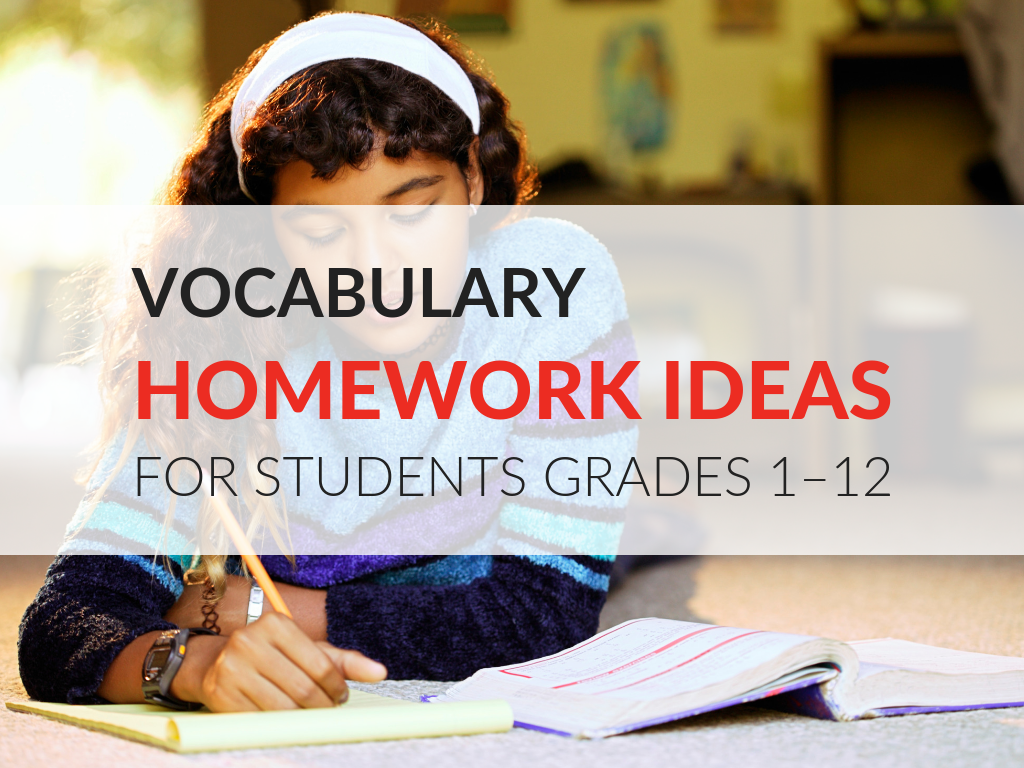
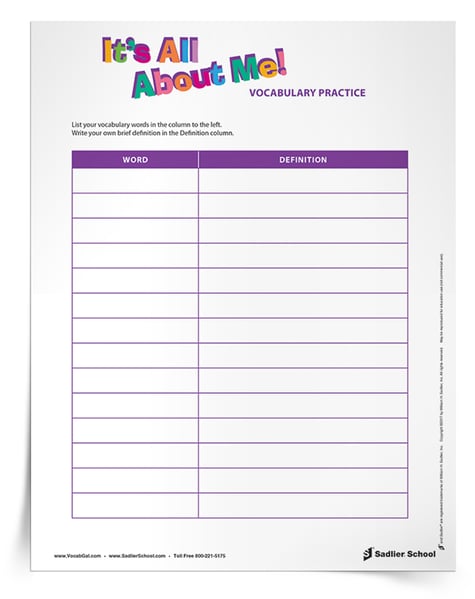


 Vocabulary Think-Tac-Toe
Vocabulary Think-Tac-Toe
 Create a Vocabulary Playlist
Create a Vocabulary Playlist
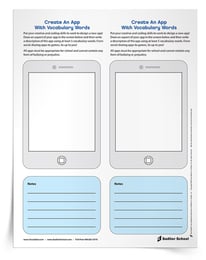 Create Apps With Words
Create Apps With Words